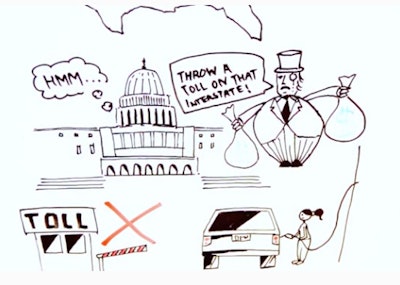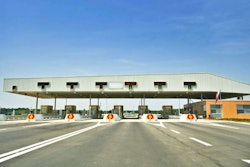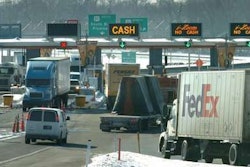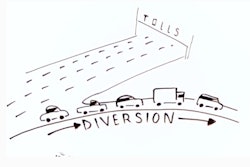Is there an Interstate tolling solution that the trucking industry might accept, or at least be willing to consider seriously? Given the trillion-dollar backlog of essential maintenance and modernization projects on the nation’s federal highway system (and the unwillingness of Congress to increase fuel taxes), the Reason Foundation has outlined “a new way forward” in the debate, the free-market think tank contends. But a trucking-led anti-toll group argues the plan takes highway funding in the wrong direction.
 ATFI graphic
ATFI graphicIn the recent Reason report, “Value-Added Tolling: A Better Deal for America’s Highway Users,” author Robert Poole argues that tolling advocates need to take trucking’s objections seriously. He notes specifically:
- No value added, with tolling simply becoming an additional cost of a highway. That was evident in a number of previous state proposals to toll Interstates.
- Diverting revenues to other uses. A number of high-profile toll agencies (mostly in the Northeast) fund other highways, mass transit, canals, public buildings, and economic development out of toll revenues.
- Double taxation. On all current toll roads, users continue to pay existing fuel taxes in addition to the tolls.
- Diverting traffic to parallel routes. While true to some extent, this is much worse when toll rates are high in order to pay for more things than the toll road, Poole maintains.
In response to these objections, the Value-Added Tolling concept calls for a new model that would apply to newly tolled highways such as rebuilt interstates. Its aim is to make such tolling “a true highway user fee, not a hybrid of toll and tax,” and to respond positively to long-standing concerns of highway user groups.
The five key principles are:
1. Limit the use of toll revenues to the tolled facilities. Assuming there were legally strong provisions along these lines, this would counter reasonable fears that Interstate tolling would amount to making users of those facilities cash cows to solve the whole array of transportation funding problems.
2. Charge only enough to cover the full capital and operating costs of the tolled facilities. Based on the quantitative analysis done for Reason’s Interstate 2.0 study last year, this could mean tolls somewhat lower than occur on some legacy toll roads today. Thus, eliminating diversion of toll revenue will reduce diversion of traffic to parallel routes.
3. Toll only when construction or reconstruction of a corridor is completed. Thus, a rebuilt Interstate corridor would be treated just like a new toll road or toll bridge, financed based on the future toll revenues.
4. Use tolls to replace – not supplement – existing highway taxes. With all-electronic tolling, it is simple to create a rebate system in which state DOTs would provide tolled-Interstate customers with rebates of the amount of state fuel tax revenue implied by the miles they drove on such Interstates.
5. Provide a higher level of service for rebuilt tolled Interstates – such as maintaining no lower than Level of Service C on rural Interstates and LOS D on urban Interstates.
“These provisions are all designed to create a value proposition for Interstate users, making it worth their while to use modernized, 21st-century Interstates, and therefore to embrace the five provisions as necessary conditions for expanded Interstate tolling,” Poole says.
The Reason Foundation calls on Congress to expand the current Interstate tolling pilot program to all 50 states conditional on the incorporation of Value-Added Tolling principles.
Indeed, legislation has been introduced that would amend the Intermodal Surface Transportation Efficiency Act of 1991 to remove limits on the number of state or local governments that may establish value pricing pilot programs. The bill also would increase from 3 to 10 the number of Interstate highways, bridges, or tunnels where a state may collect tolls for the reconstruction and rehabilitation.
The value-added plan might sound reasonable, but the Alliance for Toll-Free Interstates isn’t buying it.
The advocacy group, whose membership includes a number top trucking companies as well as American Trucking Associations and the Truckload Carriers Association, has provided CCJ its “rebuttal” to Value-Added Tolling proposal. The fully annotated version may be read here, but the key points are these:
1. Electronic Tolling is an inefficient means of collecting revenue >>
2. The trucking industry is not the only business community opposed to tolls >>
3. The policies of “Value-Added Tolling” are based on flawed assumptions >>
5. The “Value-Added Tolling” policies fail to address traffic diversion>>










